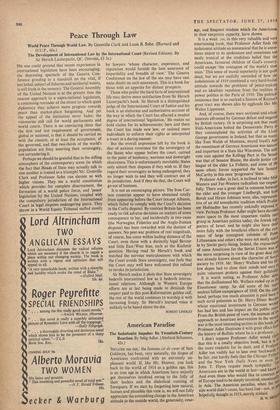American Paradise
`INCLUDE me out,' the famous cri de caner of Sam Goldwyn, has been, very naturally, the slogan of Americans confronted with an extremely un- pleasant world. If, like Mr. Hoover, you look back to the world of 1914 as a golden age, this is an iron age in which Americans have unjustly got themselves involved owing to the folly of their leaders and the diabolical cunning of foreigners. If we start by forgetting how natural, human and plausible this view is, we will not fully appreciate the astonishing change in the American attitude to the outside world, the generosity, cour-
age, and frequent wisdom which the Americana, in their corporate capacity, have shown.
It is a weak ass, in this very valuable and very entertaining book, that Professor Adler finds the isolationist attitude so nonsensical that he is some times unjust to its spokesmen and sometimes too easily ironical at the credulous belief that the Americans, favoured children of God's country, could escape 'the contagion of the world's slovi stain.' This sense of moral superiority is not quite dead, but we are usefully reminded of how the isolationism of 1919 combined a very hard-boiled attitude towards the problems of peace-making and an idealistic repulsion from the realities of power politics in the Paris of 1919. The political innocence that is so marked a feature of Keynes' great tract was shown also by eggheads like Mr. Walter Lippmann.
And, of course, there were sectional and ethnic interests affronted by German defeat and angered by British victory. (It is surprising not that many Irish-Americans bolted the Democratic Party as they contemplated the activities of the Lloyd George government in Ireland, but that so many, like Tom Walsh of Montana, stayed loyal.) And the resentment of German Americans was natural and important in a State like Wisconsin. The only vote cast against the Kellogg Pact in the Senate was that of Senator Blaine, the docile junior al' league of the elder La Follette, and some of the same ethnic forces supported the late Senator McCarthy in this once 'progressive' State. Professor Adler, in fact, is inclined to take Mid Western and Far-Western radicalism too respect' fully. There was a great deal in common between the elder and the younger Lindbergh, and both Borah and Hiram Johnson were, alas, represents' tive of an old xenophobic tradition which Prof& sor Hofstadter has recently unkindly exposed t° view. Perhaps Professor Adler might have devoted more space to the most important visible lace group in American politics today, the Jewish 50' porters of Israel, and he might also have dealt more fully with the beneficial effects of the exir tence of large immigrant colonies of Poles' Lithuanians and others who were not easily take° in by Soviet party-lining. Indeed, the engoueme1 of some Americans for the Soviet Union was all the more surprising in view of the great deal that was already known about the character of Soviet society by 1939. Mr. Henry Wallace and his fel' low dupes had to close their minds and ear: t° quite vehement protests against their gullibi It is worth noting, as Professor Adler does' that the disillusioned Mr. Wallace ended up in the Eisenhower camp. So did some of his more zealous- fellow-campaigners of 1948. On the 010 hand, perhaps too much attention is paid here t° such acrid polemists as Dr. Harry Elmer Bar es' whose emotional investment in German waif" has had less and less impact on the public in 14 From the British point of view, the account oftlse, approach to American intervention in the seals, war is the most interesting section in this book, an° Professor Adler illustrates it with great effect frog the history of Buffalo where he is a professor. I don't suppose Professor Adler would clair° that this is a totally objective book, but it tS the more readable for its slant, and if Profe Adler too visibly has to lean over backwards ° be fair, one hardly feels that the Chicago Tribali and the New York Daily News or even „Mt' John T. Flynn require much sympathy. TIP Americans are in the world at last—and know And even those who would like to contract Onl of Europe tend to be deeply involved, emotiorg in Asia. The American paradise, when the side world didn't count, has been lost—not, as hopefully thought in 1919, merely mislaid.


































 Previous page
Previous page